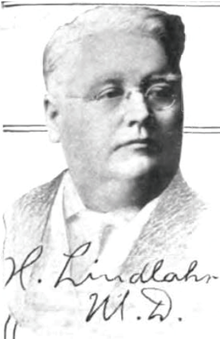Henry Lindlahr | |
|---|---|
 | |
| Born | March 1, 1862 Cologne |
| Died | March 26, 1924 Chicago |
| Nationality | American |
| Occupation | physician |
Henry Lindlahr (March 1, 1862 – March 26, 1924) was the author of one of the cornerstone texts of American naturopathic medicine, Nature Cure, which includes topics about disease suppression versus elimination, hydrotherapy, and the importance of fresh air and sun bathing.
Career[edit]
Lindlahr was born March 1, 1862, in Cologne, Kingdom of Prussia.[1] He devoted himself to healing after being helped by Father Sebastian Kneipp (1821–1897),[2][3] in Europe. Lindlahr was also influenced by the ideas of Bernarr Macfadden.[4] He graduated from the National Medical University in Illinois,US.[5] In 1902, he opened his practice in Chicago. In 1914, he founded the Lindlahr Sanitarium, in Elmhurst, Illinois.[6][7]
Lindlahr and his institute were criticized by medical health experts for peddling quackery.[4][8][9] For example, Lindlahr was an advocate of "Iridiagnosis", a method alleged to diagnosis any disease by examining the eye alone. He also claimed that vaccination was worthless against smallpox and was the cause of cancer, tuberculosis and insanity.[8]
Physician Morris Fishbein noted that "the methods of diagnosis used in the Lindlahr institution were preposterous, the methods of treatment varied and ridiculous." These included dubious treatments such as chiropractic, homeopathy, osteopathy and "strange" diets.[4] He died in Chicago on March 26, 1924.[10]
Publications[edit]
- Nature Cure; Philosophy and Practice Based on the Unity of Disease and Cure. Nature Cure Publishing. 1913. ISBN 9781150083747. reprint General Books LLC, 2009, ISBN 978-1-150-08374-7
- The Lindlahr Vegetarian Cook Book and ABC of Natural Dietetics (also published as: Nature Cure Cook Book and ABC of Natural Dietetics). Nature Cure Pub. Co. 1918. ISBN 9780766186606.; reprint Kessinger Publishing, 2004, ISBN 978-0-7661-8660-6 also published as: Nature Cure Cook Book and ABC of Natural Dietetics
- Philosophy of Natural Therapeutics. The Lindlahr Publishing Co. 1918. ISBN 9780766183834. Reprint Kessinger Publishing, 2004, ISBN 978-0-7661-8383-4
- Practice of Natural Therapeutics. The Lindlahr Pub. Co. 1919.
henry lindlahr.
- Iridiagnosis and Other Diagnostic Methods. The Lindlahr Pub. Co. 1919.
henry lindlahr.
reprint Kessinger Publishing, 2004, ISBN 978-0-7661-8730-6
References[edit]
- ^ Herringshaw, Clark J; Mae F. Herringshaw (1914). Clark J. Herringshaw's City Blue Book of Current Biography: Chicagoans of 1914. Chicago, Ill: American Publishers' Association. p. 215. OCLC 18539361.
- ^ "Kneipp: The life of Sebstian Kneipp". Kneipp.de. Archived from the original on 2011-07-19. Retrieved 2010-10-21.
- ^ "Father Kneipp dead. - His Cold Water Cure at Woereshofen Made Him Famous". New York Times. 1897-06-18. Retrieved 2010-10-21.
- ^ a b c Fishbein, Morris. (1932). Fads and Quackery in Healing: An Analysis of the Foibles of the Healing Cults. New York: Covici Friede Publishers. pp. 118-119
- ^ "Naturopathy and Its Professors (1932)". Naturowatch.org. 1927-11-07. Retrieved 2010-10-21.
- ^ "About Dr Henry Lindlahr". Irisandyou.com. Retrieved 2010-10-21.
- ^ "Lindlahr Sanitarium". Enzyme-facts.com. Archived from the original on 2010-08-20. Retrieved 2010-10-21.
- ^ a b Anonymous. (1922). The Propaganda for Reform. JAMA: The Journal of the American Medical Association 79 (4): 1628.
- ^ Yadon, Laurence; Smith, Robet Barr. (2011). Old West Swindlers. Pelican Publishing Company. p. 135. ISBN 978-1-58980-863-8
- ^ "Henry Lindlahr, 26 Mar 1924; Public Board of Health, Archives, Springfield; FHL microfilm 1,877,526". Illinois Deaths and Stillbirths, 1916-1947 via FamilySearch. Retrieved 7 June 2016.
External links[edit]
- Works by Henry Lindlahr at Project Gutenberg
- Works by or about Henry Lindlahr at Internet Archive
- "Nature Cure" Archived 2010-10-14 at the Wayback Machine, Soil and Health Library
Well, that’s interesting to know that Psilotum nudum are known as whisk ferns. Psilotum nudum is the commoner species of the two. While the P. flaccidum is a rare species and is found in the tropical islands. Both the species are usually epiphytic in habit and grow upon tree ferns. These species may also be terrestrial and grow in humus or in the crevices of the rocks.
View the detailed Guide of Psilotum nudum: Detailed Study Of Psilotum Nudum (Whisk Fern), Classification, Anatomy, Reproduction